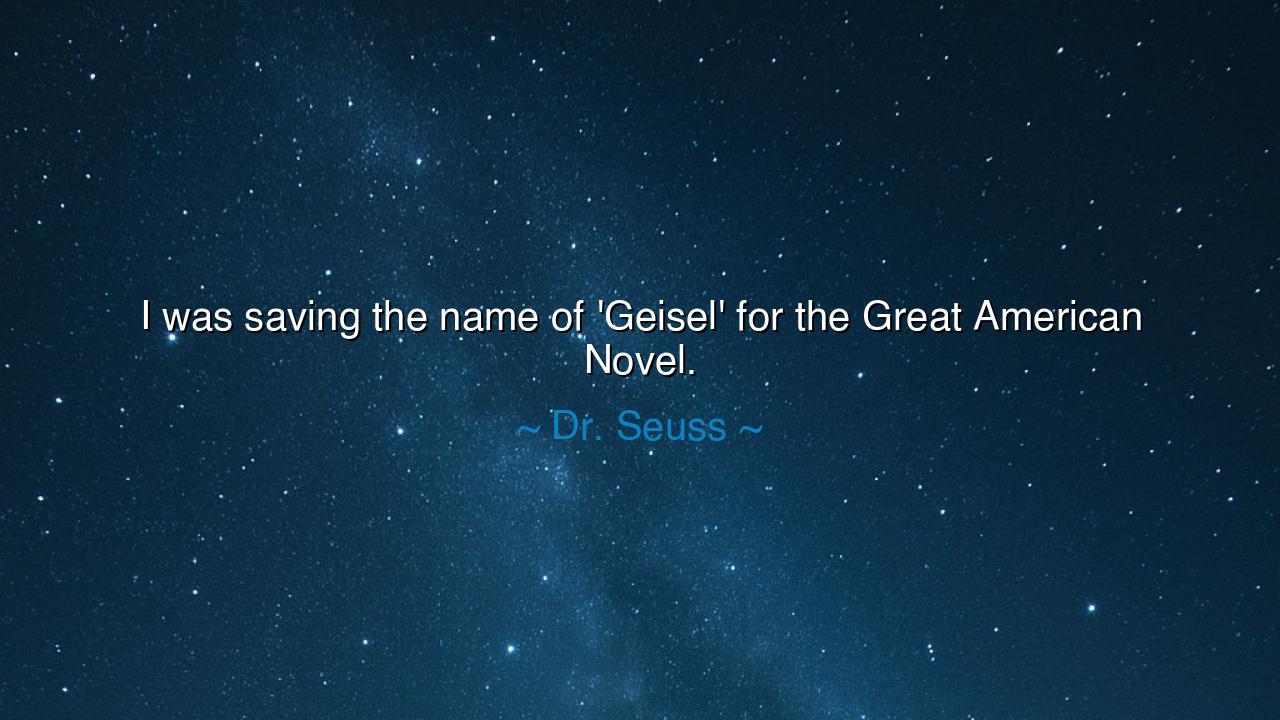
I was saving the name of 'Geisel' for the Great American Novel.






“I was saving the name of ‘Geisel’ for the Great American Novel.” Thus spoke Dr. Seuss, whose real name was Theodor Seuss Geisel, a man who cloaked wisdom in whimsy and taught generations to dream in rhyme. At first glance, his words seem playful — a jest from a writer known for laughter. Yet beneath their humor lies a truth profound and humbling: that greatness often comes not in the way we plan, but in the way life calls us to serve. Seuss dreamed of writing the Great American Novel, yet destiny led him elsewhere — to a world of children’s books, where he would shape imaginations, nurture empathy, and teach entire generations how to see with wonder.
In this quote, we glimpse both irony and enlightenment. By “saving the name of Geisel,” Dr. Seuss admits that he once believed his true greatness would be achieved under his real name — that “Geisel” would one day stand among the serious authors of literature. The name Dr. Seuss was, in his mind, a mere disguise, a mask for lighter things — clever verses, drawings of cats in hats, and worlds filled with nonsense. But in the end, it was that very name, born of play, that became immortal. The joke, as fate would have it, was on him. For in his humility and humor, he discovered that art born of joy can change the world more deeply than art born of ambition.
The origin of this saying reaches back to Geisel’s early career. After his studies at Dartmouth and Oxford, he began as an illustrator and advertising artist, using “Dr. Seuss” as a pen name to conceal his identity after being banned from writing for a college magazine. His path to fame was uncertain and crooked, marked by rejection and struggle. Yet through persistence and creativity, he forged a new kind of literature — stories that did not lecture, but delighted; that did not preach, but awakened. The man who once dreamed of grand prose instead gave the world “The Lorax,” “Green Eggs and Ham,” and “Oh, The Places You’ll Go!” — parables that carried more truth and moral fire than many “serious” novels ever could.
And thus, we see in his words a lesson about purpose and humility. How often do we, like Geisel, believe that our worth lies in a single vision — a single dream of greatness we have defined for ourselves? Yet life, in its wisdom, may steer us down an unexpected road. The true calling often arrives not with fanfare, but with laughter. The Great American Novel that Geisel sought to write never came, and yet, in his playful tales, he wrote something far greater — the Great American Imagination. His books spoke not to critics, but to the childlike spirit within every human heart.
This truth has echoed across history. Consider Leonardo da Vinci, who sought glory as a scientist and inventor, yet achieved immortality through art; or Charles Darwin, who wished merely to study nature quietly, yet changed humanity’s understanding of itself. Greatness, as these lives reveal, is rarely where we expect it to be. The name we “save” for greatness may never be used, because life, in its infinite humor, finds another name for us — one born of service, sincerity, and love.
The deeper wisdom in Dr. Seuss’s reflection is this: our destiny often hides beneath the disguise of our delight. What we dismiss as mere play, as unworthy of legacy, may become the very thing that defines us. Seuss, through his “childish” stories, spoke to the timeless truths of equality, environmental stewardship, imagination, and courage. His works made the complex simple, and the simple sacred. He reminds us that genius lies not in chasing prestige, but in creating with joy, honesty, and heart.
So, my children, take this teaching to heart: do not wait for the “great work” before giving your best. Do not reserve your truest name, your fullest self, for some imagined future triumph. Pour your spirit into the task before you — however small, however playful — and let life decide what becomes great. For the hand that writes for love writes more truly than the hand that writes for glory. The paths to meaning are many, and the world often crowns with eternity those who did not seek it.
And thus, the lesson of Dr. Seuss stands clear: the name we make sacred is not the one we save for greatness, but the one we live with passion. Whatever your craft, let it carry laughter, kindness, and truth. Let your life be the novel that endures — written not in grand chapters, but in joyful moments of purpose. For in the end, it is not the name that matters, but the spirit behind it. Theodor Geisel dreamed of greatness; Dr. Seuss became it.






AAdministratorAdministrator
Welcome, honored guests. Please leave a comment, we will respond soon